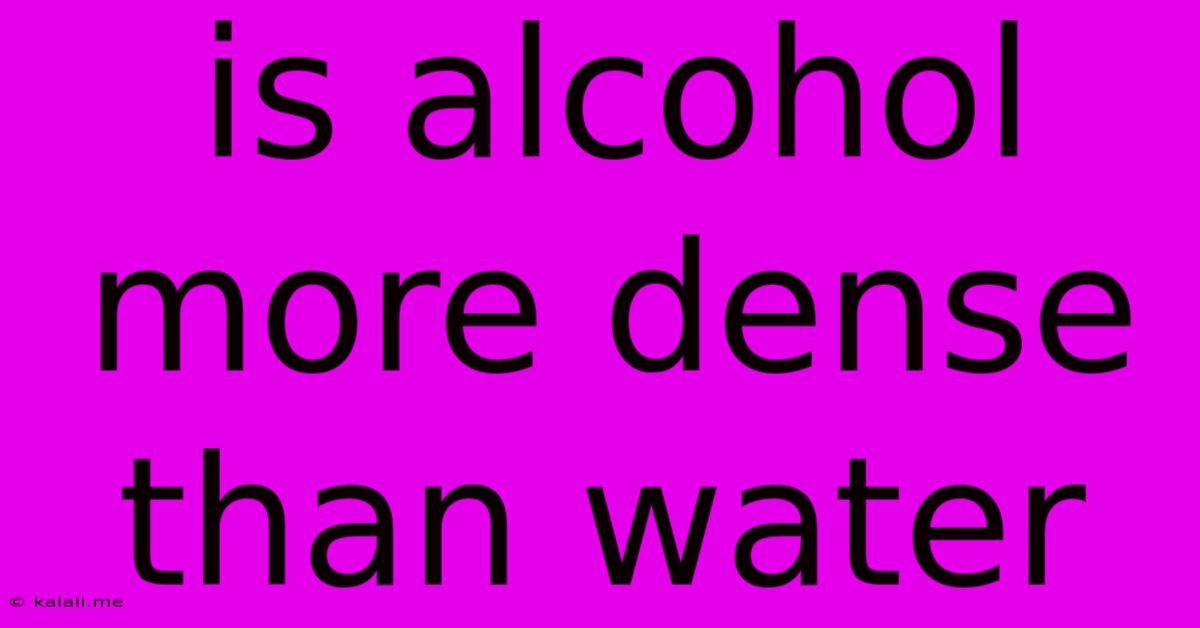Is Alcohol More Dense Than Water
Kalali
Jun 10, 2025 · 3 min read

Table of Contents
Is Alcohol More Dense Than Water? A Deep Dive into Density and Specific Gravity
Is alcohol denser than water? The simple answer is: it depends. This seemingly straightforward question requires a more nuanced understanding of density, specific gravity, and the various types of alcohol. This article will explore the relationship between alcohol and water density, providing you with the knowledge to answer this question accurately for different alcoholic beverages.
While many assume alcohol is lighter than water, the truth is more complex. The density of alcohol, specifically ethanol (the type found in alcoholic beverages), is slightly less dense than water. This means that a given volume of ethanol will weigh less than the same volume of water.
Understanding Density and Specific Gravity
Density is a measure of mass per unit volume. It tells us how much "stuff" is packed into a given space. Water has a density of approximately 1 gram per cubic centimeter (g/cm³) at 4°C. Substances with densities greater than 1 g/cm³ will sink in water, while those with densities less than 1 g/cm³ will float.
Specific gravity is a dimensionless quantity that compares the density of a substance to the density of a reference substance, typically water. A specific gravity of less than 1 indicates that the substance is less dense than water; a specific gravity greater than 1 indicates it's denser.
Ethanol vs. Water Density
Pure ethanol (the type of alcohol in alcoholic drinks) has a density of approximately 0.789 g/cm³ at 20°C. This is notably less dense than water. This explains why pure ethanol floats on water.
The Complicating Factor: Alcoholic Beverages
The density of alcoholic beverages is not solely determined by the ethanol content. Other ingredients significantly impact the overall density. For example:
-
Sugar: Sugary drinks like liqueurs and some cocktails will have a higher density than water because of the dissolved sugars. The added sugars increase the overall mass without a proportional increase in volume.
-
Other Additives: The presence of flavorings, coloring agents, and other additives also influences the final density of the beverage. These additions contribute to the overall mass and can alter the density significantly.
-
Alcohol Percentage: The higher the alcohol percentage (ABV - alcohol by volume) generally results in a lower density because ethanol's density is less than water. However, this is only true when considering pure ethanol versus water. The other ingredients in alcoholic beverages will outweigh this effect in many cases.
Conclusion: It's Not Always Simple
So, is alcohol denser than water? Pure ethanol is less dense than water. However, the density of alcoholic beverages is highly variable, depending on the alcohol concentration and other ingredients present. A sweet liqueur will almost certainly be denser than water, while a high-proof spirit might have a density close to, but still less than, water. Therefore, a definitive answer requires knowing the specific composition of the alcoholic beverage in question. Understanding density and specific gravity provides the crucial context needed to analyze this seemingly simple question.
Latest Posts
Latest Posts
-
Does A Dishwasher Need A Gfci
Jun 10, 2025
-
How Do You Spell Degrees Celsius
Jun 10, 2025
-
Do You Need A Permit To Finish A Basement
Jun 10, 2025
-
Why Japan Is Known As The Land Of Rising Sun
Jun 10, 2025
-
Difference Between A Zoom And Telephoto Lens
Jun 10, 2025
Related Post
Thank you for visiting our website which covers about Is Alcohol More Dense Than Water . We hope the information provided has been useful to you. Feel free to contact us if you have any questions or need further assistance. See you next time and don't miss to bookmark.